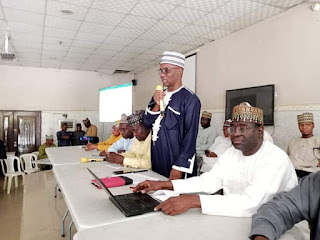In 2021, an assessment was carried out in the primary healthcare facilities in Kano state across five thematic areas of the World Health Organization’s framework for leadership and management which are functional governance, institutional processes, management competency, performance management, and enabling environment.
The finding from the baseline assessment showed key deficits in seven thematic areas that need a serious address for the primary health care centres to work efficiently. The thematic areas are data management; financial management, facility management, Human Resources for Health, logistics and supply chain, planning and community relations, and quality of care.
On data management, the assessed health facilities struggle with the submission of fully populated National Health Management Information System, NHMIS forms; over 50% of the assessed health facilities were unable to conduct and manage review sessions to disseminate and use data to inform program decisions; Primary Health Care Centres, PHCs do not have a system for proper storage and archival of data tools; on Human Resources for Health, HRH, health facilities performed fairly with major gaps in the management and tracking staff leaves and performance appraisal; health workers lateness and absence from work continues to be an issue in PHCs; health workers are typically informed of their job functions “informally”, structured orientation is not well implemented or lacking entirely across HFs; on logistic and supply chain, over 60% of health facilities performed well for quantification and drug dispensing subthemes, while underperforming in stock management and DRF subthemes; surprisingly 24% of PHCs do not communicate the recommended drug dosage, usage and adverse effects to patients.
On planning and community relations, the majority of the assessed health facilities conduct planning and community relations activities but some gaps remain with the documentation of findings from the planning process and routine implementation of action points from WDC meetings. On financial management, health facilities performed abysmally in budgeting with over 80% of the assessed health facilities struggling with budget development; health facilities performed fairly at conducting expense management with suboptimal delineation of roles for some expenses processes exposing the inadequacies of financial management processes; while funds are remitted by health facilities to the appropriate banks, some financial management processes (transmission and documentation of receipts) that will improve the transparency of fund management is lacking, and lastly, quality of care, most primary health care centres have poor/no system for soliciting patient feedback and key performance indicators for tracking quality of care; also many facilities do not/poorly document Quality Management Team meetings and do not know how to develop Quality Improvement Plan; and 72% of them do not fully fill their referral forms & only 6% of their follow-up on referral cases.
Based on these findings and in an effort to address them, supporting partners from the Bill and Melinda Gates Foundation, BMGF, TA Connect, and Solina Centre for International Development and Research, SCIDaR joins hands with Kano state primary health care management board, KNSPHCMB via the state ministry of health to offer helping hand in addressing the finding.
A program ‘Kano State Primary Health Care Management Capacity Strengthening Project’ which is simply coined ‘Kano Manage PHC’ came into being to address the challenges identified. Two [Nasarawa and Dawakin Tofa] out of the six zones under the board were identified where the facility managers of the facilities under the zone will be trained for ten days on the seven identified thematic areas in two batches, the first batch held between 21st August to 1st September 2023.
The training was provided by the competent team of program officers related to the thematic area from the board, including lecturers from Kano State College of Health Science and Technology, and partners of SCIDar who are all experts in each chosen thematic area.
Participants were intensively and rigorously trained via power presentation, group, and plenary session, and all participated actively.
The program will cover 6 months where by mentors are assigned to the participating facilities for mentoring and supervision to ensure all these thematic areas are given their due concern and treatment.
It is expected that the facility managers trained in the first phase [and those in the second phase] will justify the training received and bring into practice lessons learned in administering their facilities so that they become role models to others in every aspect.
Sani Garba Mohammed, Kano State Primary Health Care Management Board, Na’ibawa Kano.

